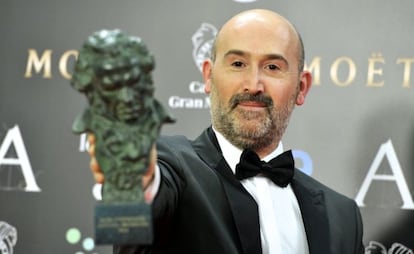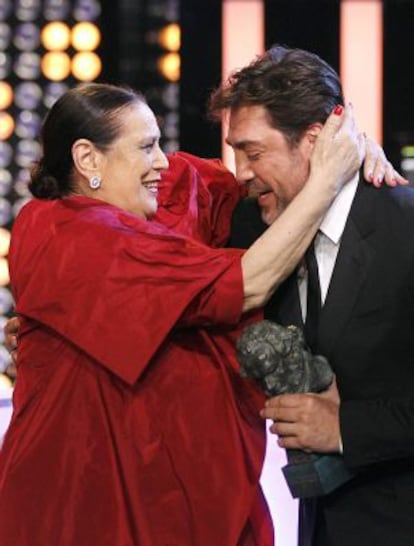Goya winners offer cheer on a bitter night for politics
Culture minister’s no-show taken as a snub by Spain’s cinema sector Javier Bardem slams lack of respect by PP official

Perhaps it was not wholly surprising that in a country gripped by a seemingly never-ending crisis, the big winners of Sunday's Goya Awards — something like the Spanish Oscars — should be two comedies with a good dose of melancholy, when not downright horror: Vivir es fácil con los ojos cerrados, released under the English title of Living Is Easy With Eyes Closed) and Las brujas de Zugarramurdi (international title: Witching and Bitching).
But there was nothing amusing about the criticism leveled by many of the night's winners against the government over everything from film policy to abortion reform.
Not that the government's top culture representative was there to hear about it. Education and Culture Minister José Ignacio Wert was conspicuously absent from the 28th Goya Awards ceremony after alleging a scheduling conflict, leading to even greater complaints by the movie industry over the lack of sync with the conservative Popular Party (PP) administration. The state secretary for culture, José María Lassalle, took his place inside Madrid’s Príncipe Felipe convention center.
“I don't know how many countries in the world would accept that a minister show such indifference to the industry he represents," said the actor Javier Bardem, who called Wert "the anti-culture minister."

Meanwhile, Enrique González Macho, president of the Spanish Film Academy, added that "making movies in Spain these days is practically a heroic act." In a nervous and emotional speech that sounded like a farewell after three years at the helm, he begged for forgiveness for “not doing the things I should have done, the things I wanted to do but couldn't or didn't know how."
The president went on to list the industry's grievances: online piracy, a VAT rate of 21 percent on theater tickets, delays in passing intellectual property legislation, and lack of institutional and financial support. Yet he called on his audience to “believe in the beauty of our dreams, in the goodness of our work, and in the possibility of making them come true."
Making dreams come true was certainly the main message in Living Is Easy With Eyes Closed, which took home six of the seven Goyas it was nominated for, including Best Movie, Best Director, Best Leading Actor and Best Original Screenplay. At times funny, at times bittersweet, it is a tale set in 1966 about a school teacher who hears that John Lennon is coming to Almería to shoot a film and decides to drive down to meet him and ask him for an unusual favor.
Juan Carrión, the 89-year-old former school teacher whom the movie is based upon, was sitting in the first row, where he was able to see director David Trueba and actor Javier Cámara (who plays him in the movie) go up on stage to accept the prizes. For Cámara, a veteran of the Spanish movie industry, this was his first Goya after five failed nominations. Trueba talked about the movie's message, that one should never lose hope, and added that "it is good to be reminded that there are all kinds of people in the Spanish film industry, both leftists and rightists."
The remark underscored how the Goya Awards have become a politicized event ever since the days of the previous PP administration of José María Aznar, whose support for the Iraq War fueled passionate onstage protests at the ceremony. While criticism also extended to the Socialist government of José Luis Rodríguez Zapatero — previous Academy president Alex de la Iglesia quit over discrepancies with then-Culture Minister Ángeles González-Sinde over piracy control — conservative politicians feel like the whipping boys of the film world's ire. In a radio interview, former Madrid premier Esperanza Aguirre, who heads the Madrid regional branch of the conservative party, stated that the Goya Awards "have transformed into a gala against the PP."
It was precisely Alex de la Iglesia who directed the other big winner of the night, Witching and Bitching, which took home as many as eight awards, though mostly for technical aspects. De la Iglesia was also absent from the ceremony as he was working on a new project in Argentina.
The remaining Goyas were won by La herida (Best Actress and Best New Director); La gran familia española (Best Original Song and Best Supporting Actor) and Cannibal (Best Cinematography). A Venezuelan movie, Azul y no tan rosa, won a Goya Award for the first time in the event’s 28-year history.
The three-hour gala had its ups and downs, including a few inexplicable musical numbers and a very uneven pace, but the 3.5 million spectators sitting in front of their TV sets (the lowest audience since 2009) had their share of laughs when members of the popular humor program Muchachada Nui — Joaquín Reyes, Ernesto Sevilla, Julián Reyes, Carlos Areces and Raúl Arévalo — recreated "the best movies that were never made." At one point Reyes showed up on stage with plastic breasts, pretending to be a Femen activist clamoring for a higher VAT.
Tu suscripción se está usando en otro dispositivo
¿Quieres añadir otro usuario a tu suscripción?
Si continúas leyendo en este dispositivo, no se podrá leer en el otro.
FlechaTu suscripción se está usando en otro dispositivo y solo puedes acceder a EL PAÍS desde un dispositivo a la vez.
Si quieres compartir tu cuenta, cambia tu suscripción a la modalidad Premium, así podrás añadir otro usuario. Cada uno accederá con su propia cuenta de email, lo que os permitirá personalizar vuestra experiencia en EL PAÍS.
¿Tienes una suscripción de empresa? Accede aquí para contratar más cuentas.
En el caso de no saber quién está usando tu cuenta, te recomendamos cambiar tu contraseña aquí.
Si decides continuar compartiendo tu cuenta, este mensaje se mostrará en tu dispositivo y en el de la otra persona que está usando tu cuenta de forma indefinida, afectando a tu experiencia de lectura. Puedes consultar aquí los términos y condiciones de la suscripción digital.








































